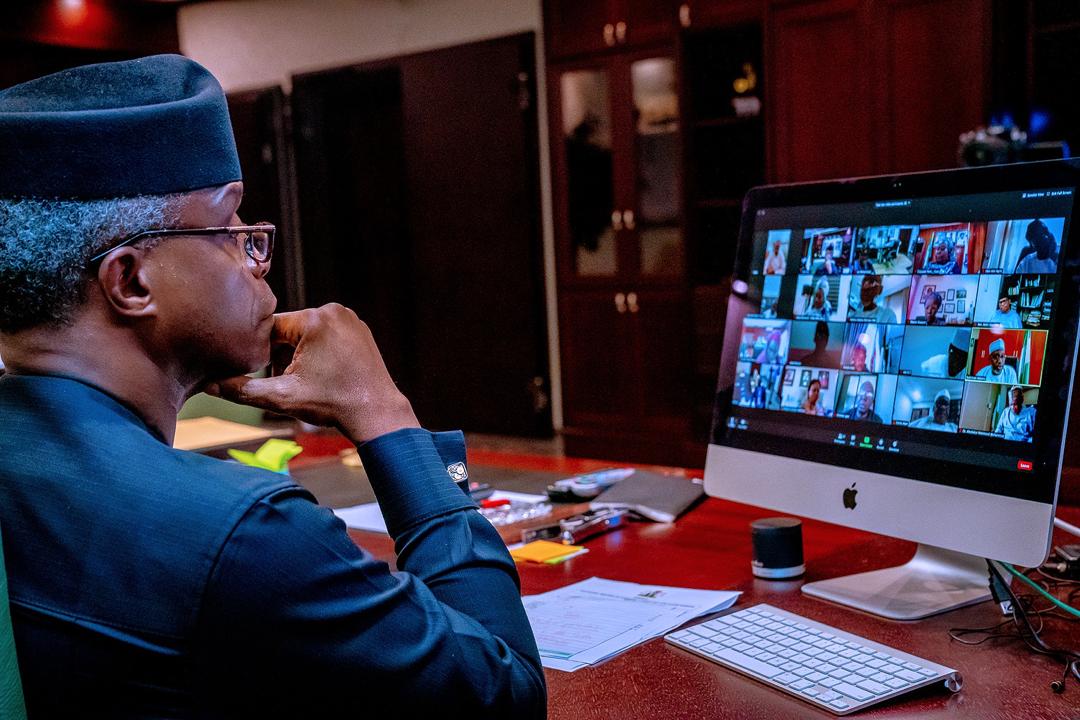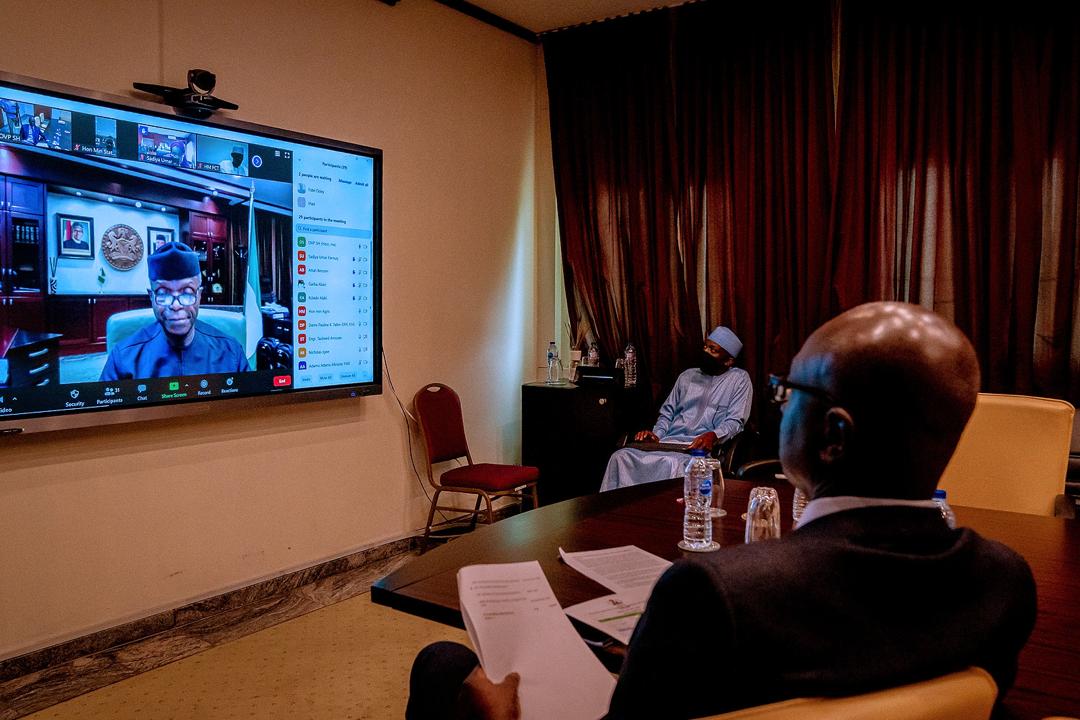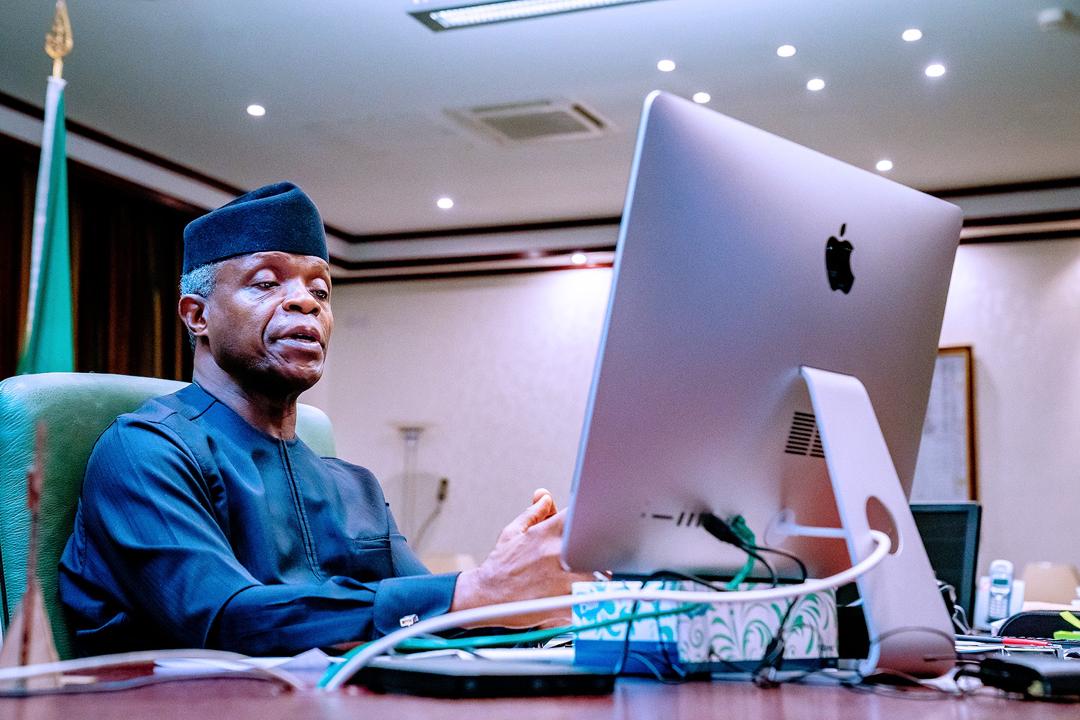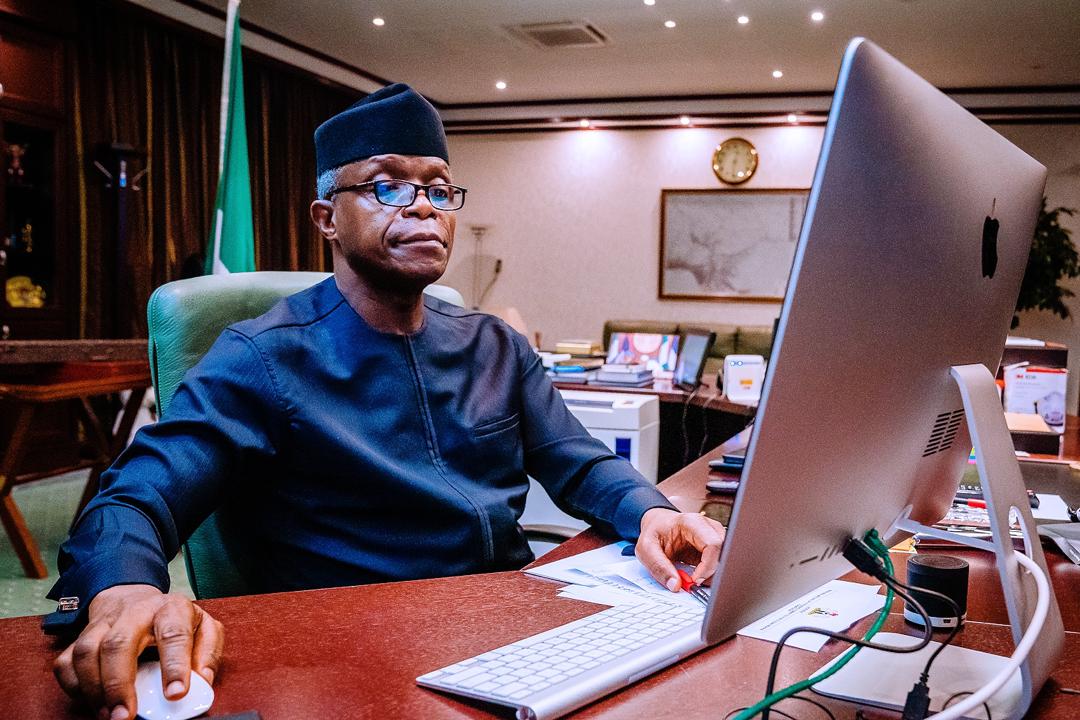VP’s Remarks At Virtual Inauguration Of Members Of Steering Committee On “Clean Nigeria: Use The Toilet Campaign”
AN ADDRESS BY PROF. YEMI OSINBAJO GCON, SAN, THE VICE PRESIDENT OF THE FEDERAL REPUBLIC OF NIGERIA, ON THE OCCASION OF THE INAUGURATION OF THE MEMBERS OF THE STEERING COMMITTEE FOR THE CLEAN NIGERIA: USE THE TOILET CAMPAIGN HELD THROUGH A VIRTUAL MEETING ON THE 28TH OF MAY, 2020.
Protocols
It gives me great pleasure to address you all on this occasion of the inauguration of the Steering Committee of the Clean Nigeria: Use the Toilet Campaign. I would like to especially welcome the Chairman, Nigeria Governors Forum, the Chairman, Senate Committee on Water Resources, the Chairman, House Committee on Water Resources, friends and colleagues from the International Community and stakeholders who have all connected to this virtual meeting. We appreciate the time you have taken out to join us bearing in mind other engagements that you have shelved for this occasion. I also welcome members of the Federal Executive Council as well as other distinguished members of the Steering Committee for the Clean Nigeria Campaign.
We may recall that the Clean Nigeria Campaign, was launched in November 19, 2019 as a national initiative to drive the process towards the attainment of the national target of making Nigeria Open defecation free by 2025. This is in accordance with the National Roadmap developed and launched in 2016. Since then, we have made some progress in the implementation of the Roadmap, with 20 LGAs across the country so far certified as Open Defecation Free according to the National Open Defecation Free (ODF) Protocol.
The key objectives of the campaign include the implementation of a campaign to end open defecation in Nigeria by 2025. This will involve mobilizing support and resources (i) at the highest political level and (ii) within the private sector and from development partners. The campaign will create a pool of resource persons to support local actors to implement this nationwide transformational sanitation agenda; the campaign will mobilize various strata of our society to imbibe a new culture of safe sanitation through behavioural change communication and advocacy strategies. We will also establish mechanisms for tracking progress and sharing knowledge and lessons learnt. As part of the governance structure of the Clean Nigeria Campaign, a Steering Committee which I have the privilege of chairing, will meet bi-annually and this has been created with the following terms of reference:
- Provide strategic oversight to the implementation of the Clean Nigeria Campaign.
- Oversee and advise on the implementation and strategic orientation proposed by the Clean Nigeria Secretariat to execute the campaign.
- Advise the Clean Nigeria Secretariat as necessary on any issues it might face in the course of implementing the campaign.
- Facilitate maximum synergy between the Clean Nigeria Secretariat and other relevant government agencies including security and law enforcement agencies and stakeholders towards meeting the campaign objectives.
- Facilitate access of the Clean Nigeria Secretariat to technical and financial resources for effective implementation of the campaign.
- Receive and review progress reports of implementation of the campaign.
- Ensure that results of the campaign monitoring outcomes are well communicated to all stakeholders.
I have no doubt that with the high quality of the membership of the Steering Committee, there will be effective articulation and coordination of the campaign.
Let me state rather regrettably that Nigeria still tops the global league of countries in which open defecation is prevalent with an estimated 47million of our people indulging in the practice. It has been abundantly established that open defecation has a negative impact on the health, educational outcomes and socio-economic life of the populace, especially women and children. The practise of open defecation has become common in many communities due to lack of sanitation facilities. Many public places either lack sanitation facilities or have facilities which are not accessible or fit to use. National access to improved sanitation facilities stands at 41.5% of which 19.2% are safely managed according to the SDG standard (WASHNORM 2018 data). Similarly, access to basic sanitation facilities in schools is only 33.5%, while in health care facilities is even lower with access at 11.7%.
So, an informed and candid assessment of the Water, Sanitation and Hygiene (WASH) sector indicates that it is in critical condition and needs more attention with a minimum of three times the current level of investments required to achieve the Sustainable Development Goals (SDGs) for water and sanitation.
It is this assessment that led to the development of the National Action Plan for the revitalization of the WASH sector, which was launched by the President on 8th November 2018, with the declaration of a State of Emergency in the Sector. The objective of the National Action Plan is to ensure that every Nigerian has access to sustainable and safely managed WASH services by 2030 in line with SDG 6.1 and 6.2.
The challenges of the sector can be effectively tackled through the Clean Nigeria Campaign by mobilizing high level political support and resources, and the entire populace towards building a new culture of safe sanitation and ending the practice of open defecation.
Our efforts are aimed at encouraging States and Local Governments to invest in the provision of WASH facilities and to ensure that Nigeria achieves her SDG targets for water and sanitation by 2030. While some State Governments have declared a “State of Emergency” in the WASH Sector, only very few have flagged off the Clean Nigeria Campaign to end open defecation in their various States, with specific dates and a clear roadmap.
I am delighted to note that the Presidential launch of the campaign was immediately followed by the signing of Executive Order 009 titled “Ending Open Defecation in Nigeria by 2025 and other related matters” and the Order was signed by Mr President on 20th November 2019 to give legal backing to the Campaign and this order was gazetted in February 2020. Since the launch was performed, the Federal Ministry of Water Resources has made presentations to the Nigerian Governors’ Forum, the National Economic Council (NEC) and the Senate and House Committees on Water as well as other critical stakeholders.
So, we are embarking upon this initiative at a most auspicious time. As our nation confronts the COVID-19 pandemic, we recognize that expanding access to Water, Sanitation and Hygiene facilities is our most effective weapon against the scourge of infectious diseases. Ensuring the provision of adequate WASH facilities in our communities is the cornerstone of our efforts to strengthen the resilience of our public health structures beyond the present challenge of COVID-19. This is the basis of our commitment to ending open defecation and more broadly to raising the standards in the WASH sector.
I wish to commend the Federal Ministry of Water Resources, the organizers of this event and the engine room of the campaign, for quickly setting up a functional Secretariat as a coordinating structure for engagement with all stakeholders towards achieving the campaign objectives as approved by the Federal Executive Council.
They have also remarkably carried out an effective advocacy outreach to different media houses. I am pleased to note that we also have a very strong commitment from the Private Sector through their coordination body, Organized Private Sector in Water Sanitation and Hygiene (OPS-WASH) led by a National Coordinator.
Groups and companies such as Coca-Cola, Guinness Nigeria Plc, IHS Towers and Nigerians in Diaspora (NIDCOM), have also made strong individual commitments, supporting our campaign to end open defecation in Nigeria by 2025.
To the esteemed members of this Steering Committee, may I say that our work is well cut out for us. This campaign is one to end a major hazard to the health and well-being of Nigerians.
We are privileged to be the arrowhead of what will be a fundamental transformation to a cleaner and healthier society. I have no doubt that we have commitment, resourcefulness and creativity needed to drive this campaign.
Finally, I wish to congratulate the Honourable Minister of Water Resources, Engr. Suleiman Adamu and his team for their hard work and unwavering focus on achieving the great objectives of this national effort to end open defecation in Nigeria.
It is now my special pleasure and privilege to formally inaugurate the Steering Committee of the Clean Nigeria Campaign.
Thank you very much and God bless you.





